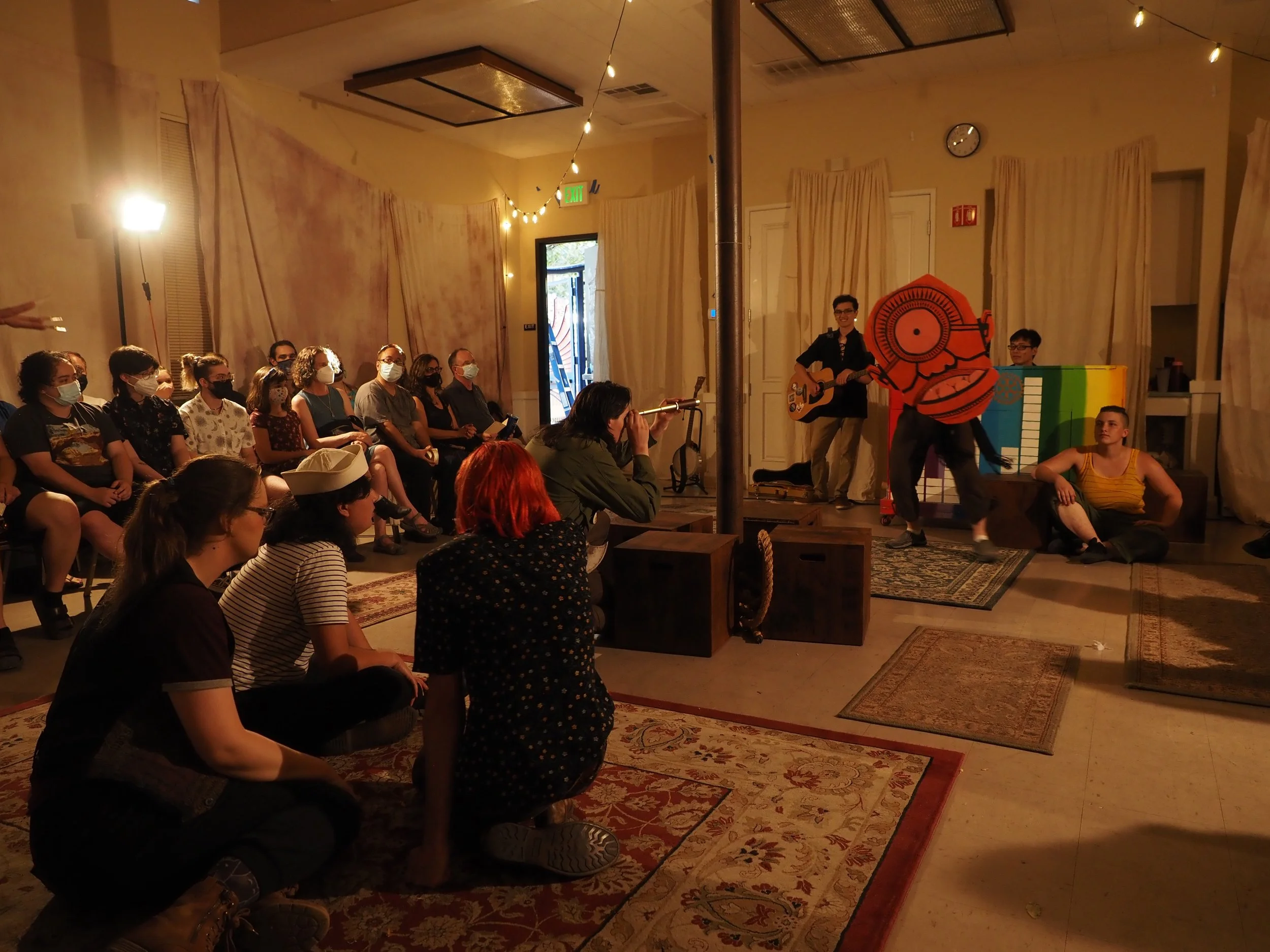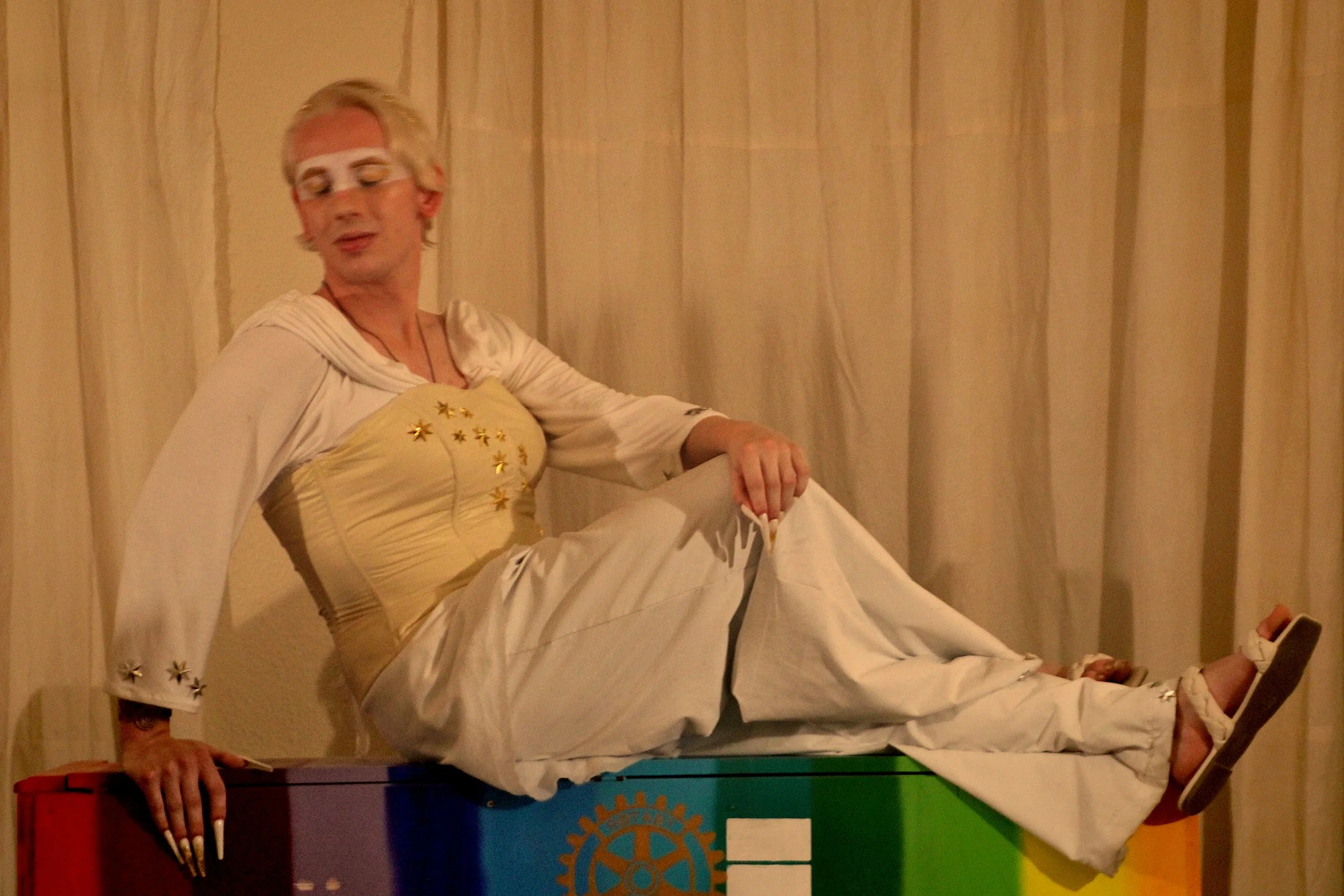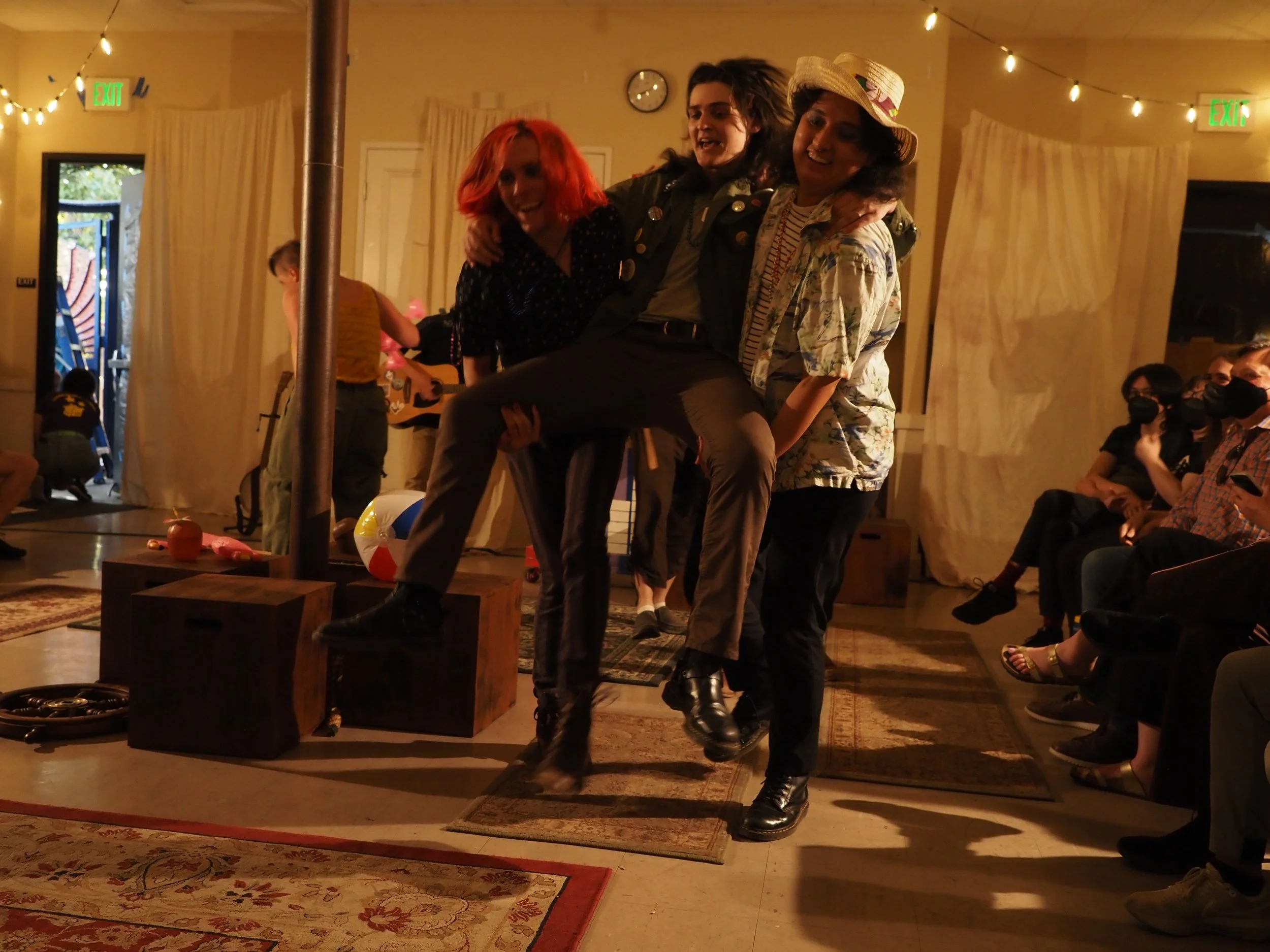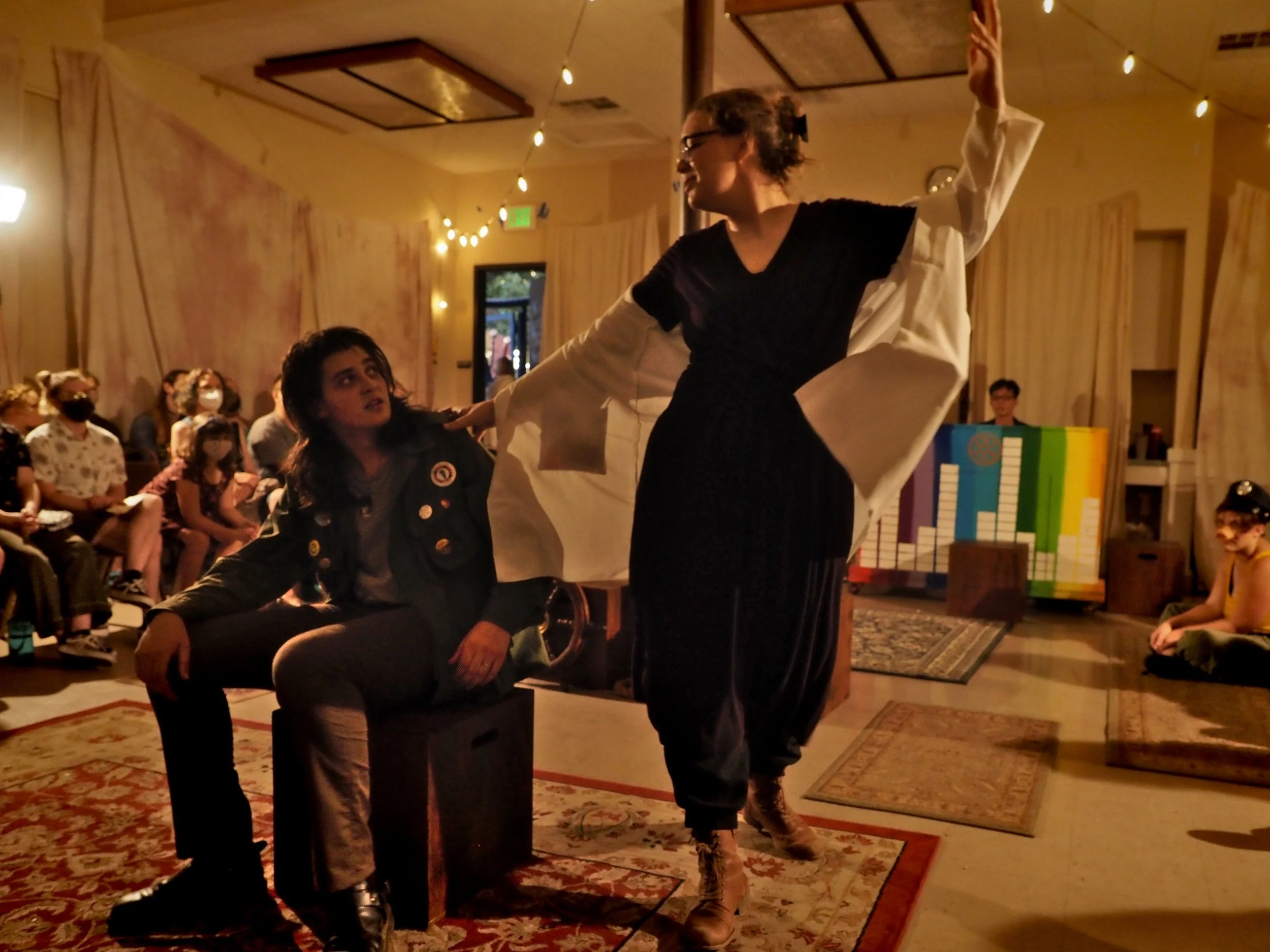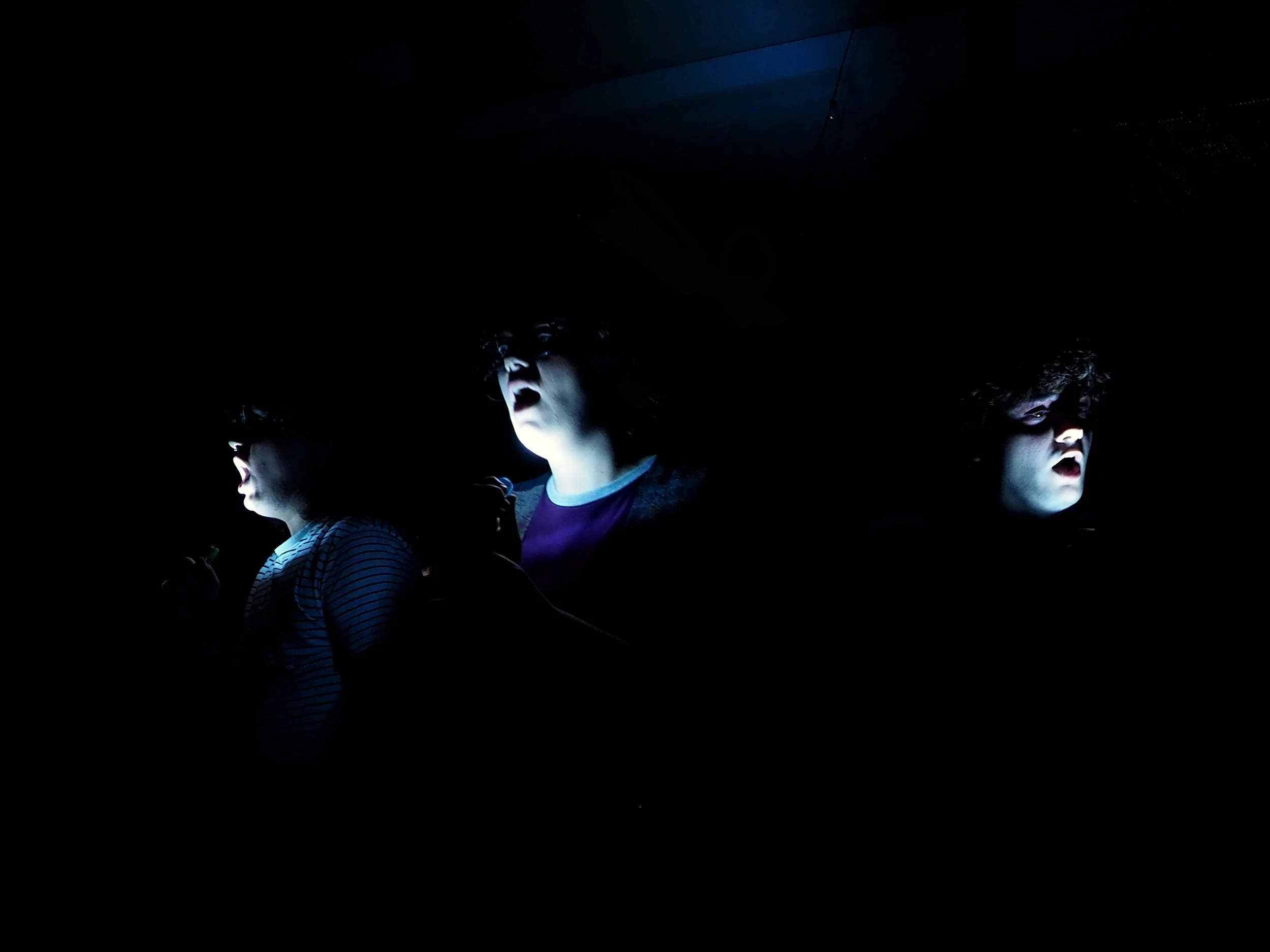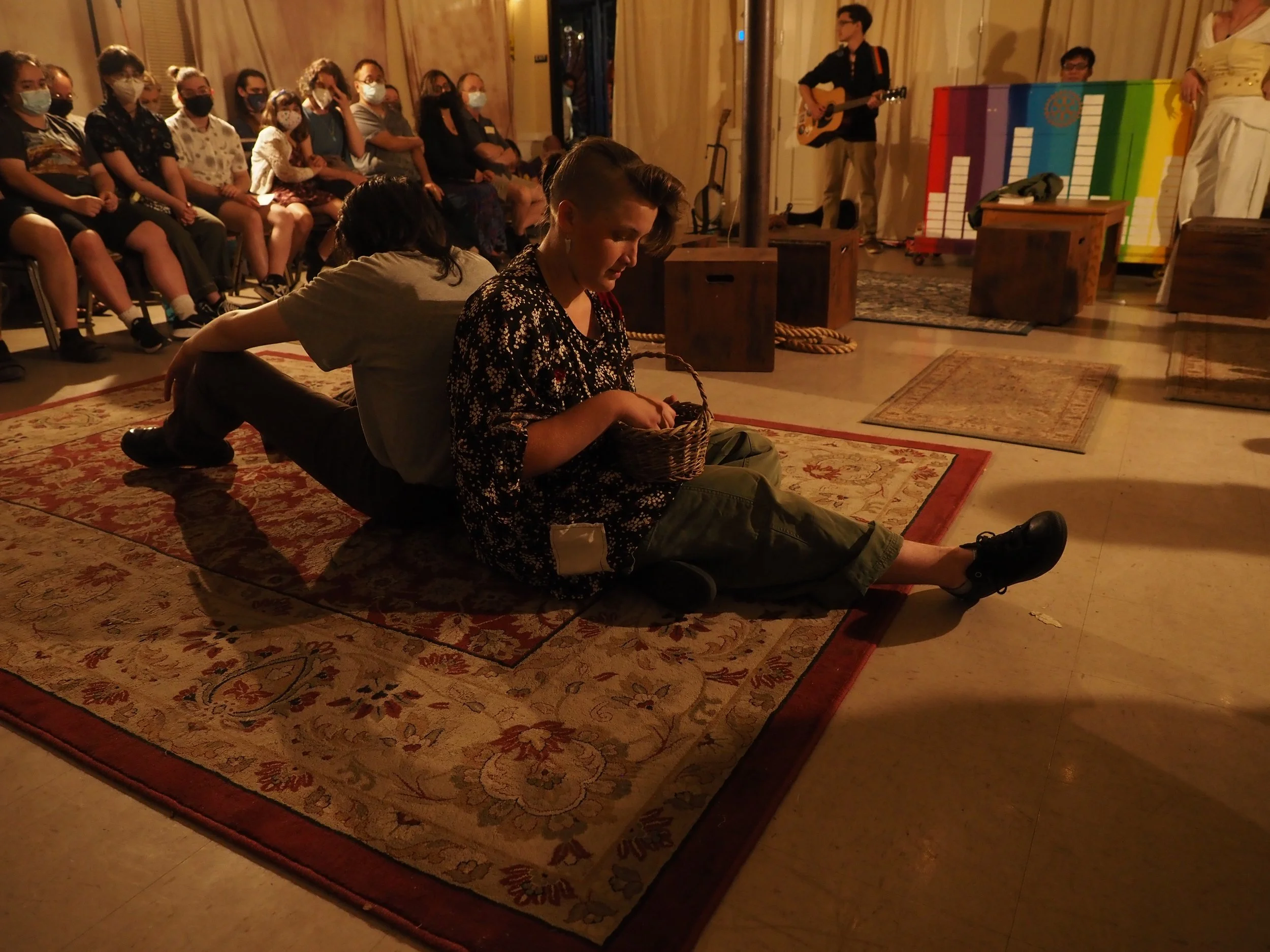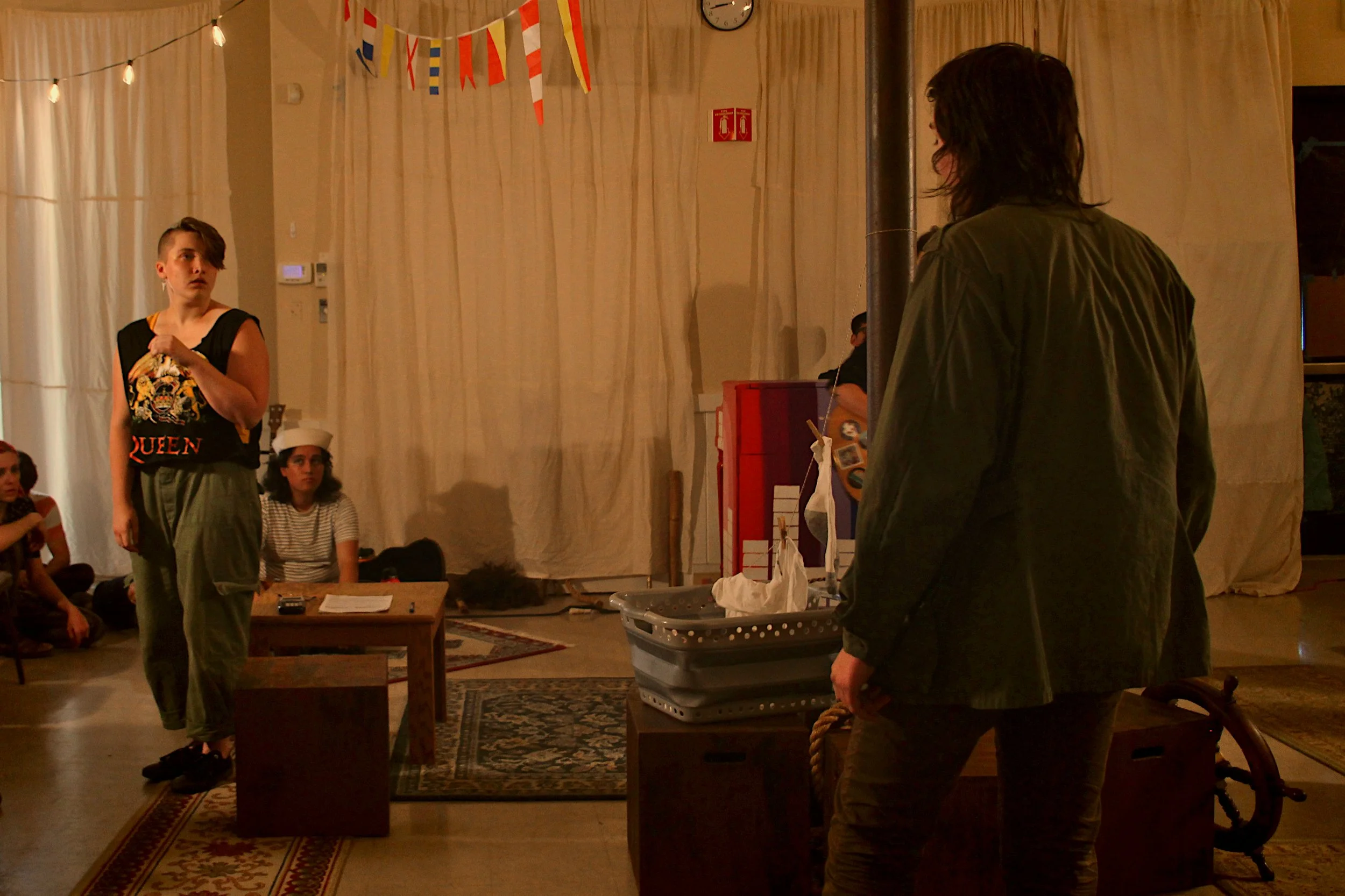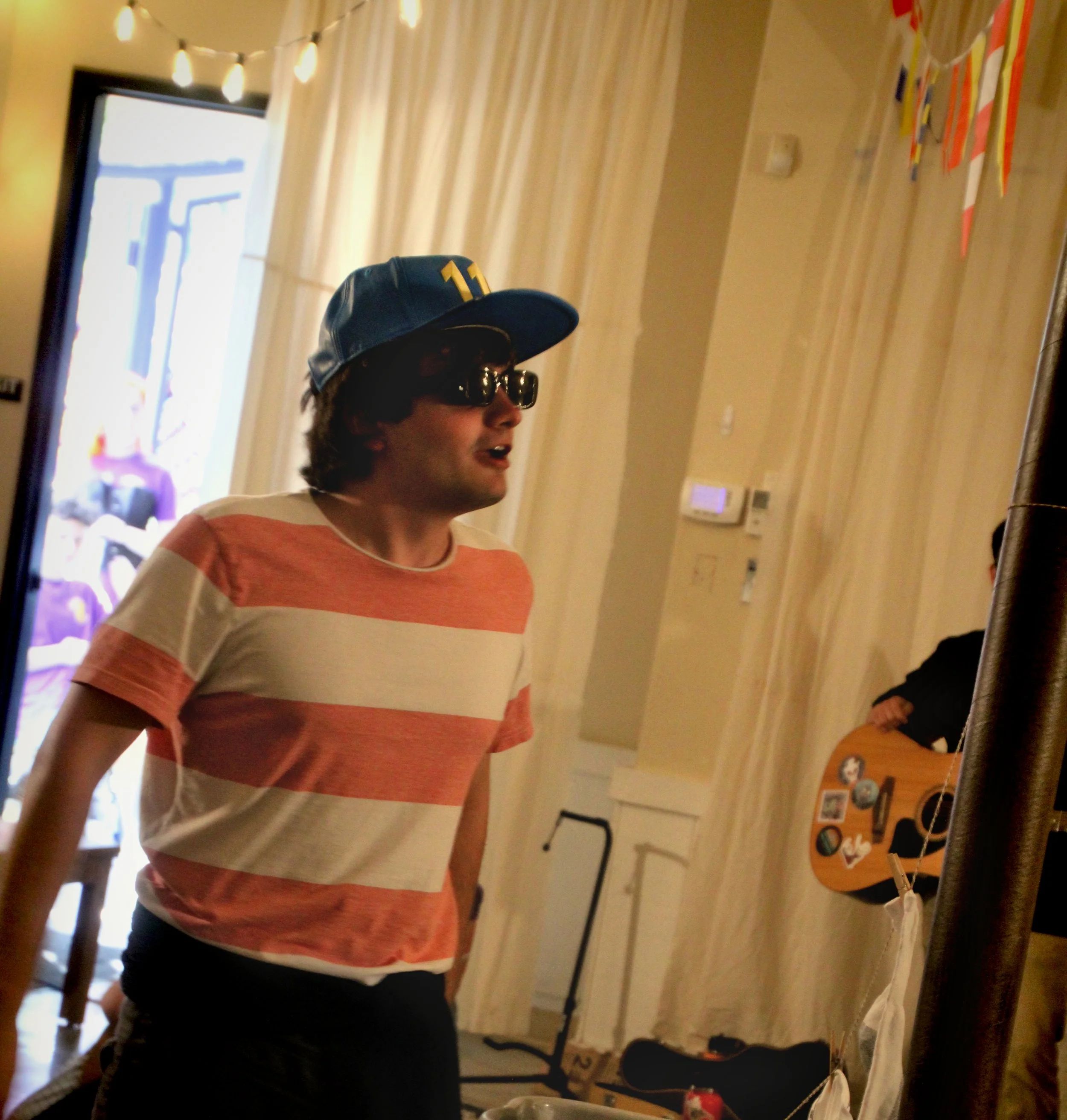THE ODYSSEY SHOW! (2023)
A new ancient musical.
After ten years of bloody fighting in the Trojan War, Odysseus, legendary Greek king, is ready to sail home to his wife and home in Ithaca, but the Gods have other plans. This adaptation of books 9-12 of Homer’s Odyssey tells of his many adventures and misadventures in the form of a raucous, vaudevillian musical—replete with clowning, puppetry, folkdance, and an original folk-punk score.
The Odyssey Show! was an original musical written by Cassian Grove, with music by Rory Kinsolving, first performed August 19th and 20th, 2023, at Vista Park Community Center in San José.
Cast
Alex (Lexie) Lindquist — Emcee, Sappho
Elia Reichardt — Odysseus
Francisco "Frankie" Vargas — Sailor, Lotus Eater, Polyphemus, Derek, Tiresias, Cow
Cassian Grove — Sailor, Cyclops, Aeolus, Diogenes, Anticlea, Siren, Cow
Molly Buck — Sailor, Circe, Lotus Eater, Pliny the Elder, Siren
Rory Kinsolving — Sailor, Lotus Eater, William Shakespeare
Tangent Sacket Pyle — Sailor, Cyclops, Penelope, George Washington, Siren, Calypso
Band
Mark Wong — Piano, SFX
Anthony Simons — Guitar, SFX, Poseidon
This show was sponsored by Betsy Moore, the Durrett-Reilly Family, the Welsh-Bucks, Vargas Drywall, Inc., and the Pyle Family.
Crew
Rory Kinsolving — Director, musical director
Heidi Le Huynh — Production Stage Manager, Lighting technician
Kenzie Derbiondi — Costume design and construction
Winter Kamas — Costume design and construction
Cassian Grove — Set and graphic design, choreography
Nick Johnson — Props Master, stage crew
Tangent Sacket Pyle — Puppet construction
Fiona Kinsolving — Greek Choreography
Sam Grove, Ezra Van Dyke, Sonny Noller — construction
With thanks to Kristoph Klover of Flowinglass Music and Jennifer Koga
SYNOPSIS
Act 1
After the performers welcome the audience into the performance space, they recite the evocation of the muse. The Emcee appears, and introduces the show. Odysseus and his sailors are departing for Ithaca after the grueling Trojan war, and discuss their plans for a peacetime life (“I’m Going Home”). After a storm blows them off course, they land on an island populated by blissed-out, lotus-eating ex-businessmen. The sailors are enraptured by the lotus eaters’ promises of a life free of responsibilities and connections, but Odysseus, refusing to abandon his home and family, forces them to return to their journey. Back on the ship, Odysseus reminisces on his wife, Penelope (“Just Over the Horizon”).
Next, the sailors land on the cyclopes’ island. In desperation, they sneak into the cave home of Polyphemus, largest of the cyclopes, and steal some of his leftovers. But, to their horror, he returns and traps them in his cave, threatening to eat one sailor a day. Thinking quickly, Odysseus, introducing himself under the name “Nobody,” begins to butter Polyphemus up, and he and his men throw a wild party with the intent of getting the cyclops drunk (Song for the Survivors (“Polyphemus' Drinking Song)”). Once Polyphemus passes out, Odysseus and the sailors blind him with sharpened sticks. His screams alert his fellow cyclopes, but they, a pair of hippies, mistake his cries that “Nobody is hurting [him]” for an expression of existential angst, and unhelpfully recommend a variety of self-care techniques. Odysseus and his sailors escape the cave by hiding from the blinded Polyphemus under his sheep. But as they sail away, Odysseus foolishly reveals his real name to Polyphemus, and Polyphemus calls upon his father, Poseidon (played by a member of the band), to curse them to wander the seas forever and never return home.
The ship next lands at the floating tropical island of Aeolia, where they meet the kindly, if overly talkative, wind god Aeolus. He welcomes them to his island paradise and brags about his accomplishments with an elaborate, Jimmy Buffet-style musical number (“King of the Wind”), but Odysseus explains that they cannot stay long. Out of sympathy for his homesickness, Aeolus gives Odysseus a bag containing every wind but the west wind, allowing for an easy journey home. Right before they reach Ithaca, however, the sailors become convinced that the bag must contain treasure of some kind, and so steal it. Upon being opened, the bag releases all the winds at once, buffeting the ship all the way back to Aeolia, to Odysseus’ dismay. Odysseus asks Aeolus to repeat his gift, but Aeolus, surmising that their misfortunes must be caused by a divine curse, sympathetically rebuffs them, and they set out once more, unaided.
The Emcee appears on the ship, and warns Odysseus that he will soon be at risk from the mad scientist witch, Circe, and gives him some magical herbs to eat, which will render him immune to her magic. Sure enough, they are caught in a current that draws them unavoidably to Circe’s island of Aeaea. She feeds Odysseus and his sailors drugged cheese, which turns the sailors into pigs, though Odysseus, due to the Emcee’s magical herbs, is immune. Odysseus threatens Circe with his battleax, telling her to turn his men back to humans. She attempts to seduce him, but he remains utterly disinterested (“Circe’s Tango”), and she reluctantly reverses her spell and promises to follow a strict code of scientific ethics for the rest of her career. Odysseus asks her what he could do to reverse Poseidon’s curse, and she explains that he must travel to the land of the Cimmerians, the shadowy contact place between the world and the afterlife, to speak to the ghost of the prophet Tiresias.
Meanwhile, back in Ithaca, Penelope attempts to go on with her life, but is annoyed by the constant advances of the unpleasant suitor, Derek. Odysseus and his sailors sing a sea shanty as they sail into the unknown (“Oceans Away”).
Act 2
The Emcee warns the audience that this act will be more frightening than the previous. Odysseus journeys alone into the land of the Cimmerians (“Odysseus in Cimmeria”). He struggles to find Tiresias in a crowd of ghosts, then Tiresias warns him that to reverse the curse, he must not eat the sacred cattle of Helios on the island of Thrinacia (”Welcome to the Afterlife”). Odysseus then meets the ghost of his mother, Anticlea—who, unbeknownst to him, died while he was away from home. She forgives him for his absence, and shows him a vision of Penelope. He sees Derek pestering her, but, unable to hear what they are saying, cannot tell whether she returns Derek’s advances. Anticlea reassures Odysseus, and he returns to his ship in the land of the living.
Odysseus and his sailors sail past Circe’s island, and she warns them that there are sirens ahead, and that they must plug their ears with beeswax to avoid the lure of their song. Just as she warned, they soon come upon the sirens. Odysseus orders his men to plug their ears, but refuses to do so himself, instead telling them to tie him to the mast so that he may hear the sirens’ song (“Sirens’ Lullaby”). In spite of his struggles against the ropes, they make it through, but immediately come upon the dangers and narrow stretch of water between Scylla and Charybdis (“Scylla and Charybdis”)—Odysseus must choose between sailing nearer to the six-headed serpent Scylla, which will protect his ship and life but inevitably kill six of his men, or to the whirlpool Charybdis, which will sink the entire ship and crew. When Odysseus hesitates, the Emcee tells the audience to vote, and the rest of the scene is determined by the audience’s response. Should the audience vote for Scylla, they sail nearer to Scylla and lose six sailors, but should the audience vote for Charybdis, the Emcee begins to announce the characters’ fate, but Odysseus takes command of the narrative, directly addressing the audience about their plight, and insisting that they sacrifice six men for the good of the crew.
While Odysseus rests, his sailors foolishly land at Thrinacia, against his direct orders. When he realizes what they have done, he orders them back onto the ship, but a sudden storm traps them on the island for the night. That night, while Odysseus sleeps, Helios’ cows seductively encourage the sailors to disobey his orders and eat them, which they do. When Odysseus realizes what they have done, he chastises them for dooming the whole crew to never break Poseidon’s curse. But, understanding there is nothing to be done, they set out once more. Suddenly, a storm breaks out, far bigger than any that have been seen before, and, in a nightmarish dream ballet, Odysseus’ ship is destroyed and his sailors all drowned.
Odysseus wakes on the island of Ogygia, having washed ashore with the remains of his ship. The island’s sole inhabitant, Calypso, explains that she has always lived there alone, and comforts him and tends his wounds. For seven years, he lives on Ogygia with Calypso. As they share daily chores and grow closer as friends, Calypso gradually falls in love with him, though she knows his loyalty to Penelope means that he could never reciprocate (“Birdwatching (Calypso’s Lament)”). After seven years pass, the Emcee takes pity on both, and gently encourages Calypso to let Odysseus return home, feeling that he has served his sentence and freeing him of his curse. She gives him a driftwood plank and a simple oar, with which he finally journeys home.
Finally reaching Ithaca, Odysseus hesitates, before reuniting with Penelope after twenty years (“Wednesday Morning in Ithaca”). The Emcee thanks the audience for coming as Odysseus and Penelope catch up, and explains that Odysseus lived the rest of his life an ordinary man, in quiet and peace. Odysseus leaves the audience with some parting thoughts on the nature of growing older and the value of a peaceful life, and the whole cast sing a raucous music hall number by way of a curtain call, in which the cast, band, and crew traditionally write their own verses to introduce themselves to the audience (“I’m Going Home (Reprise)/Curtain Call”).

